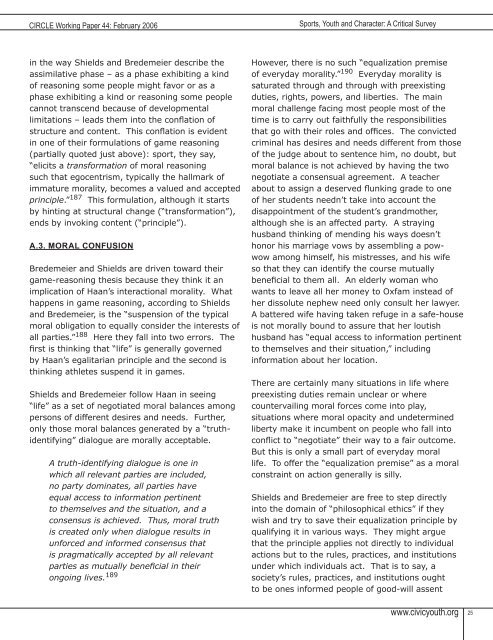The All-Sports Ministry of PA NJ & DE - Executive Summary Start-Up Budget & Prospectus
The All-Sports Ministry of PA NJ & DE - Executive Summary Start-Up Budget & Prospectus
The All-Sports Ministry of PA NJ & DE - Executive Summary Start-Up Budget & Prospectus
Create successful ePaper yourself
Turn your PDF publications into a flip-book with our unique Google optimized e-Paper software.
CIRCLE Working Paper 44: February 2006<br />
<strong>Sports</strong>, Youth and Character: A Critical Survey<br />
in the way Shields and Bredemeier describe the<br />
assimilative phase – as a phase exhibiting a kind<br />
<strong>of</strong> reasoning some people might favor or as a<br />
phase exhibiting a kind or reasoning some people<br />
cannot transcend because <strong>of</strong> developmental<br />
limitations – leads them into the conflation <strong>of</strong><br />
structure and content. This conflation is evident<br />
in one <strong>of</strong> their formulations <strong>of</strong> game reasoning<br />
(partially quoted just above): sport, they say,<br />
“elicits a transformation <strong>of</strong> moral reasoning<br />
such that egocentrism, typically the hallmark <strong>of</strong><br />
immature morality, becomes a valued and accepted<br />
principle.” 187 This formulation, although it starts<br />
by hinting at structural change (“transformation”),<br />
ends by invoking content (“principle”).<br />
A.3. MORAL CONFUSION<br />
Bredemeier and Shields are driven toward their<br />
game-reasoning thesis because they think it an<br />
implication <strong>of</strong> Haan’s interactional morality. What<br />
happens in game reasoning, according to Shields<br />
and Bredemeier, is the “suspension <strong>of</strong> the typical<br />
moral obligation to equally consider the interests <strong>of</strong><br />
all parties.” 188 Here they fall into two errors. <strong>The</strong><br />
first is thinking that “life” is generally governed<br />
by Haan’s egalitarian principle and the second is<br />
thinking athletes suspend it in games.<br />
Shields and Bredemeier follow Haan in seeing<br />
“life” as a set <strong>of</strong> negotiated moral balances among<br />
persons <strong>of</strong> different desires and needs. Further,<br />
only those moral balances generated by a “truthidentifying”<br />
dialogue are morally acceptable.<br />
A truth-identifying dialogue is one in<br />
which all relevant parties are included,<br />
no party dominates, all parties have<br />
equal access to information pertinent<br />
to themselves and the situation, and a<br />
consensus is achieved. Thus, moral truth<br />
is created only when dialogue results in<br />
unforced and informed consensus that<br />
is pragmatically accepted by all relevant<br />
parties as mutually beneficial in their<br />
ongoing lives. 189<br />
However, there is no such “equalization premise<br />
<strong>of</strong> everyday morality.” 190 Everyday morality is<br />
saturated through and through with preexisting<br />
duties, rights, powers, and liberties. <strong>The</strong> main<br />
moral challenge facing most people most <strong>of</strong> the<br />
time is to carry out faithfully the responsibilities<br />
that go with their roles and <strong>of</strong>fices. <strong>The</strong> convicted<br />
criminal has desires and needs different from those<br />
<strong>of</strong> the judge about to sentence him, no doubt, but<br />
moral balance is not achieved by having the two<br />
negotiate a consensual agreement. A teacher<br />
about to assign a deserved flunking grade to one<br />
<strong>of</strong> her students needn’t take into account the<br />
disappointment <strong>of</strong> the student’s grandmother,<br />
although she is an affected party. A straying<br />
husband thinking <strong>of</strong> mending his ways doesn’t<br />
honor his marriage vows by assembling a powwow<br />
among himself, his mistresses, and his wife<br />
so that they can identify the course mutually<br />
beneficial to them all. An elderly woman who<br />
wants to leave all her money to Oxfam instead <strong>of</strong><br />
her dissolute nephew need only consult her lawyer.<br />
A battered wife having taken refuge in a safe-house<br />
is not morally bound to assure that her loutish<br />
husband has “equal access to information pertinent<br />
to themselves and their situation,” including<br />
information about her location.<br />
<strong>The</strong>re are certainly many situations in life where<br />
preexisting duties remain unclear or where<br />
countervailing moral forces come into play,<br />
situations where moral opacity and undetermined<br />
liberty make it incumbent on people who fall into<br />
conflict to “negotiate” their way to a fair outcome.<br />
But this is only a small part <strong>of</strong> everyday moral<br />
life. To <strong>of</strong>fer the “equalization premise” as a moral<br />
constraint on action generally is silly.<br />
Shields and Bredemeier are free to step directly<br />
into the domain <strong>of</strong> “philosophical ethics” if they<br />
wish and try to save their equalization principle by<br />
qualifying it in various ways. <strong>The</strong>y might argue<br />
that the principle applies not directly to individual<br />
actions but to the rules, practices, and institutions<br />
under which individuals act. That is to say, a<br />
society’s rules, practices, and institutions ought<br />
to be ones informed people <strong>of</strong> good-will assent<br />
www.civicyouth.org 25

















